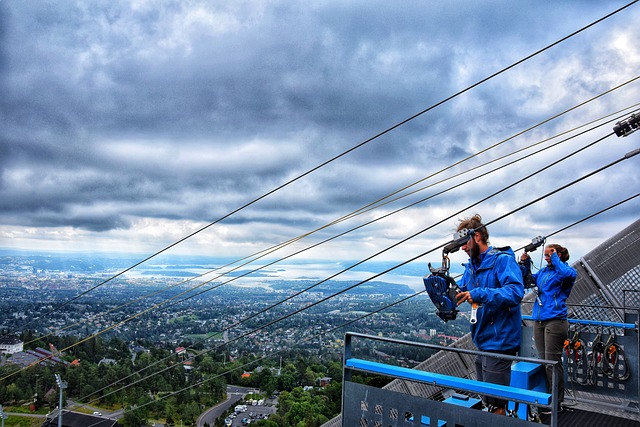
With AI, it’s like having a super-nose that can sniff out trends from heaps of data. It combs through loads of information—think past guest interactions, preferences, booking habits, and even social media chatter. By analyzing all this data, AI identifies subtle patterns that might fly under the radar, much like finding a needle in a haystack!
But how does this translate into actionable insights? Well, let’s say you run a hotel. When AI detects that a group of guests frequently books spa treatments after a day at the beach, it can suggest package deals tailored to similar future visitors. It’s all about anticipating what guests want before they even know they want it! This not only boosts satisfaction but also drives revenue.
Moreover, AI doesn’t just focus on individual guests; it analyzes aggregate data to forecast trends. Picture it like a weather forecast for your guest experience—if the AI spots an uptick in families booking during school holidays, you can prepare family-centric activities and amenities in advance. Talk about being ahead of the game!
From loyalty programs to personalized marketing campaigns, the implications are vast. With AI at the reins, businesses can speak directly to the hearts of their guests, offering them experiences they never knew they craved. So next time you’re pondering how to elevate your hospitality game, remember: AI might just be the secret ingredient to understanding and predicting your guests’ desires!
Unlocking Insights: How AI is Redefining Predictive Analytics in Guest Behavior
In the hospitality industry, data is your golden ticket. Think about it: each time a guest makes a reservation, checks in, or even orders room service, they’re leaving behind little breadcrumbs of information. AI swoops in like a superhero, analyzing these bits of data faster than you can say “upgrade.” By using machine learning algorithms, AI can identify patterns and trends that even the sharpest human mind might miss. It’s like having a crystal ball that predicts which guests would appreciate a complimentary bottle of wine or which ones are more likely to book that spa day you’ve been promoting.
But why is this so crucial? Well, imagine your hotel’s ability to customize the guest experience, making each stay feel tailor-made. When you know what your guests want based on their past behaviors, you can serve up recommendations that resonate. It’s the difference between handing someone a generic menu versus suggesting that amazing dish you know they’ll drool over. Plus, with AI diving deep into the data, you can optimize pricing strategies, staff scheduling, and even marketing campaigns, maximizing efficiency and profitability.
So, if you’re still navigating your guests’ preferences with a compass instead of a GPS, it’s time to embrace the AI revolution. Who wouldn’t want to keep their guests smiling and coming back for more?
The Future of Hospitality: AI-Powered Pattern Detection in Guest Behavior
AI is like that super observant friend who remembers every little detail about your likes and dislikes. By analyzing massive amounts of data—from your previous bookings to your dining habits—AI identifies patterns that allow hotels to cater to your unique needs. Have you ever sat in a restaurant wondering if you should order the steak or the salmon? With AI systems analyzing trends from countless guests, hotels can suggest personalized dining options that fit your palate, shortening the decision-making process and enhancing your overall experience.
Think about it: when you walk into a hotel lobby, the reception staff recognizes you by name because they’ve been alerted through AI. They know you prefer a room on a higher floor with a king-sized bed and extra towels. It’s like a warm hug of familiarity every time you travel. But it doesn’t stop there! If you’re an early riser, AI can adjust the hotel’s morning offerings, ensuring fresh coffee and pastries are ready just in time for you.
From Data to Decisions: AI’s Role in Predicting Guest Preferences and Behaviors
So, how exactly does AI predict guest preferences and behaviors? Think of it as a highly skilled detective piecing together clues from various sources—like past bookings, online reviews, and even social media interactions. By analyzing this data, AI can identify patterns and trends that might not be immediately obvious to human eyes. For instance, if you’ve booked a ski trip multiple times, AI will likely recommend winter retreats, knowing you have a penchant for cold-weather escapades.
Let’s dive a bit deeper. Through machine learning, AI refines its predictions over time. It’s similar to how our own preferences evolve; just as we might start loving a new dish after tasting it, AI gets better at recognizing what guests appreciate based on previous stays. What’s fascinating is that AI doesn’t just rely on the past. It can also analyze real-time data, like weather conditions or local events, to make suggestions that fit right into your plans.
Seeing the Unseen: How AI Identifies Hidden Patterns in Guest Interactions
You see, every time a guest interacts—whether it’s browsing your website, chatting with customer support, or posting on social media—AI is busy at work, observing behaviors and gathering insights. It analyzes specific touchpoints, like which products are most frequently viewed or which times see the highest engagement rates. It’s like having a superpower that helps businesses understand their customer’s needs before they even voice them!
So why is this so important? Well, spotting these hidden patterns helps businesses tailor experiences that resonate. If AI notices that guests who browse vegan options tend to linger longer on the site, wouldn’t it make sense to showcase more plant-based dishes? This level of personalization doesn’t just enhance customer satisfaction; it drives loyalty, turning one-time visitors into lifelong fans.
But wait, there’s more! AI not only identifies these patterns but also predicts future behaviors. Imagine being able to forecast a guest’s next steps or preferences, like a psychic who can anticipate every move. This predictive power helps companies stay ahead of the curve, offering timely promotions or personalized messages that hit the mark every single time.
Harnessing the capabilities of AI creates a win-win scenario: guests feel understood and valued, while businesses enjoy improved engagement and increased sales. Isn’t it exciting to think about a world where every interaction tells a story, and AI is the storyteller?
Predicting the Guest Journey: The Transformative Power of AI in Hospitality Analytics
Think about your last hotel stay. What if you could receive personalized recommendations before you even stepped into the lobby? With AI-powered hospitality analytics, hotels are harnessing vast amounts of data—think past bookings, social media activity, and even web searches—to understand what makes each guest tick. It’s like having a personal concierge that knows you even before you arrive, enhancing your stay from day one.
This predictive power doesn’t just streamline operations; it revolutionizes guest interactions. AI can forecast when a guest might need an extra towel or when they might be feeling peckish. Picture a room service delivery that arrives just as you’re settling in after a long journey—now that’s seamless hospitality! It’s all about creating those “wow” moments that leave a lasting impression.

Now, how does this benefit the hotel itself? By predicting patterns and trends, hotels can optimize pricing and inventory, ensuring they’re always a step ahead. It’s like having a compass guiding you through the bustling wilderness of hospitality, helping managers to make smarter, data-driven decisions.
AI in Action: Uncovering Predictive Patterns in Guest Behavior for Enhanced Experiences
Artificial Intelligence is revolutionizing the hospitality industry by diving deep into predictive patterns of guest behavior. It’s like having a crystal ball that anticipates what visitors want before they even ask. By analyzing vast amounts of data—from past bookings to online reviews—AI crafts a detailed profile of each guest. This is not just guesswork; we’re talking algorithms predicting that you might want a late checkout based on your previous stays or suggesting experiences tailored to your interests.
Have you ever noticed how Netflix seems to know exactly what you want to binge next? The same magic is happening in hospitality! With AI, hotels can create personalized experiences that transform a simple stay into a memorable adventure. Consider this: if a hotel knows you love spa treatments and have a penchant for organic food, it can proactively offer packages that include both. It’s like having a concierge who knows you better than your best friend.
But it doesn’t stop there. AI also helps identify trends, allowing hotels to adapt quickly to changing guest preferences. If data shows a rise in demand for eco-friendly amenities, hotels can pivot and meet that need, making guests feel special and understood. It’s this blend of personal touch and technological prowess that creates a seamless experience and keeps guests coming back for more.
Frequently Asked Questions
How Accurate Are AI Predictions in Understanding Guest Preferences?
AI predictions can effectively analyze large datasets to identify patterns in guest preferences, providing insights that can enhance customer experiences. Their accuracy largely depends on the quality of the data used and the algorithms employed, allowing for tailored recommendations that align with individual guest interests.
How Can AI Improve Customer Experience Through Predictive Analytics?
Utilizing predictive analytics, AI can enhance customer experience by analyzing past behaviors and preferences to anticipate future needs. This enables businesses to offer personalized recommendations, improve service efficiency, and proactively address customer concerns, ultimately fostering greater satisfaction and loyalty.
What Data Sources Are Required for AI to Detect Guest Behavior Patterns?
To effectively analyze guest behavior patterns, AI requires various data sources, including transaction history, web and mobile app interactions, customer demographics, social media activity, and feedback or survey results. These sources provide comprehensive insights into preferences and tendencies, enabling targeted marketing and personalized experiences.
What Are the Benefits of Using AI for Predictive Analytics in Hospitality?
Utilizing artificial intelligence for predictive analytics in the hospitality industry enhances decision-making by leveraging data to forecast trends, customer preferences, and operational efficiency. This approach optimizes pricing strategies, improves guest experiences through personalized services, and increases profitability by anticipating demand and minimizing costs. Overall, AI-driven insights empower businesses to stay competitive in a fast-evolving market.
What Algorithms Does AI Use to Analyze Guest Behavior Patterns?
Artificial intelligence analyzes guest behavior patterns using algorithms such as neural networks, decision trees, clustering, and regression analysis. These methods help identify trends, predict future behaviors, and segment data for targeted marketing strategies.